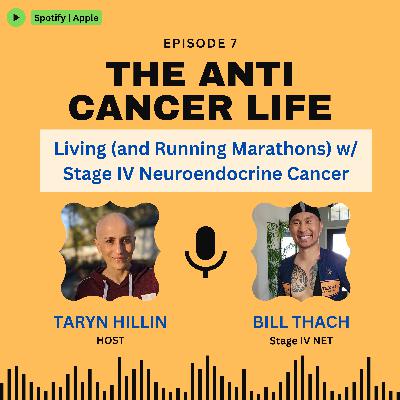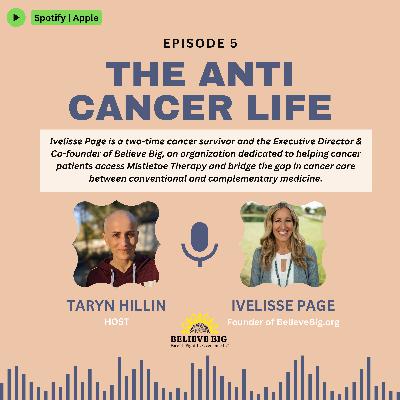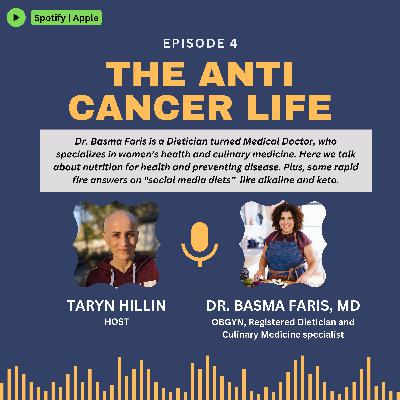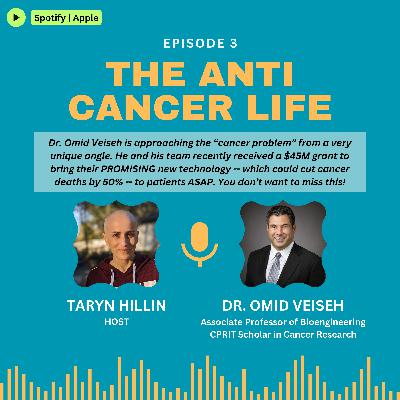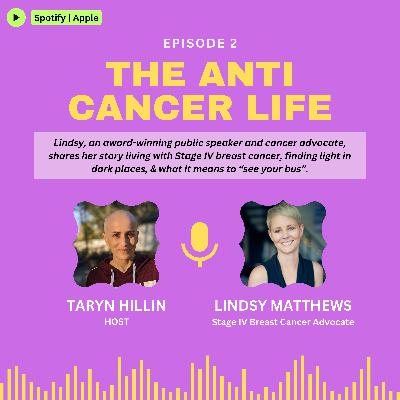Discover The Anti-Cancer Life
The Anti-Cancer Life

The Anti-Cancer Life
Author: The AntiCancer Life
Subscribed: 3Played: 2Subscribe
Share
© The AntiCancer Life
Description
In 2019 I was diagnosed with a rare and aggressive cancer that carried a dismal 7% survival rate. I went on a mission to learn everything I could about fighting and preventing future cancers using a combination of Western, Eastern, and complementary medicine. Now I'm sharing that knowledge with you. Through expert interviews with survivors, scientists and integrative oncologists The Anti-Cancer Life explores all the ways in which we can tackle cancer together.
7 Episodes
Reverse
On today's episode of The Anti-Cancer Life ...
I interviewed Bill Thach, a husband, father, and cancer survivor. Diagnosed with Neuroendocrine cancer in his 30s back in 2018, he’s on his 8th line of treatment and not giving up. Bill is living life to the fullest, including running ultra-marathons to raise awareness for NET patients.
If you didn't know Neuroendocrine is a VERY rare cancer (something Bill and I have in common) that can occur in many primary sites, including the lungs, pancreas, GI tract, uterine cervix, rectum, and more. Raising awareness is crucial to increasing funding and access to clinical trials as NET patients are often limited in resources and options.
This episode is a great listen in persevering beyond what we think is possible.
Follow Bill on IG at neccancerbillt.
Follow The AntiCancer Life at TheAntiCancerLife on IG and TT.
On today's episode of TheAntiCancerLife we're talking all things cancer, hormones, and menopause.
About today's guest, Dr. Tara Scott:
Dr. Tara Scott, known as the "Hormone Guru", helps people find the cause of their symptoms and get them on a path to optimal health. With over 25 years of experience and 3 board certifications in OB/GYN, Functional medicine and Integrative Medicine, Dr. Scott has helped thousands of patients struggling with hormone issues including endometriosis, breast cancer, weight gain, and more.
My guest today is Ivelisse Page, a two-time cancer survivor and founder of BelieveBig.org, an organization dedicated to helping cancer patients access Mistletoe Therapy and bridge the gap between conventional and complementary medicine.
So let’s talk about Mistletoe Therapy (and yes, we mean that "plant you see at Christmas"). This complementary cancer treatment is VERY popular in Europe, especially Germany, where most of it comes from. Mistletoe is used to treat cancer by reducing tumor burden, improving quality of life, and stimulating the immune system to fight cancer.
On this episode, Ivelisse shares her cancer journey, how Mistletoe helped her, and why she started BelieveBig. We also talk about the clinical trials BelieveBig is running in partnership with Johns Hopkins University.
I also used Mistletoe on my cancer journey and hope you all find this information valuable.
Below is an excerpt about Mistletoe from Memorial Sloan Kettering:
“Studies support the use of mistletoe to improve symptoms and quality of life, and reduce chemotherapy and radiotherapy side effects, including in pancreatic, lung, colorectal, and breast cancers. Some studies suggest it may help prolong survival.” (source: memorial sloan kettering cancer center).
Visit BelieveBig.org for more info.
Welcome to The AntiCancer Life, episode 4 with Dr. Basma Faris!
Dr. Basma Faris is a former Registered Dietician turned Medical Doctor, who now specializes in women's health (as an OBGYN) and culinary medicine.
What is Culinary Medicine you ask?
Culinary medicine is a new evidence-based field in medicine that blends the art of food and cooking with the science of medicine. Which is exactly what cancer patients need!
As a cancer survivor who utilized diet and nutrition in my healing journey, I was so excited to speak with Dr. Faris, who is a wealth of information on all things nutrition and medicine.
In this episode, we cover the practice of culinary medicine, optimal diets/nutrition for health and well-being, as well as some of the more popular "social media diets" we see floating around like Alkaline, Keto, and Intermittent Fasting. Do they work? Are they valid? Are there certain circumstances where we can use them? Dr. Faris gives us her expert insight.
As always, this is not medical evidence and should be used for educational purposes only. Always ask your doctor about your own personal health needs.
Today's guest on THE ANTICANCER LIFE is Dr. Omid Veiseh, Associate Professor of Bioengineering at Rice University and CPRIT Scholar in Cancer Research, where he runs a lab that could change HOW we treat cancer forever.
Let me explain.
What if instead of BUYING expensive immunotherapy drugs, your body could make them for you, inside a tiny-sized “drug factory”?
Immunotherapy is one of the most promising cancer treatments ever developed, curing previously incurable cancers…but it has limitations. It works in less than 50% of cancer patients. Not only that, certain immunotherapy treatments, like Proleukin – which is made from Interleukin-2, an immune cell your body naturally makes– has harsh side effects, a low half-life (which means it leaves your body quickly, within minutes) and, therefore, it requires frequent applications. The problem with that is when given systemically and frequently, as needed, it is tough for patients to handle. For these reasons, it’s given intravenously in an ICU and isn’t sustainable at high doses.
That’s because immune responses are a delicate balancing act. You want your body to send in immune cells and cytokines (like interleukin-2), but too much of an immune response – as anyone suffering from autoimmune disease or dealing with a “cytokine storm” knows – is dangerous. Interleukin-2 needs a local target, that’s how the body designed it to work.
When Interleukin-2 is used in cancer treatment and works, it works well. But as previously mentioned, it’s difficult to administer and comes with many issues. But what if we could solve all of those problems?
What if instead of paying for expensive, difficult-to-administer cancer drugs, you could simply receive an injection of programmed cells that make a continuous dose of Interleukin-2 where it’s needed most … at your tumor site? What if this lasted for weeks or months and the burden of invasive cancer treatment, suddenly became less expensive, less time-consuming, and WORKED BETTER?
That’s where Dr. Omid Veiseh comes in. He’s an Associate Professor in the Department of Bioengineering at Rice University, where he runs a research program aimed at engineering next-generation treatments for a wide range of human diseases, including cancer.
He and his team have been working on NANO DRUG FACTORIES, which are exactly what the name implies. These are implantable “drug factories” – tiny in size, made up of engineered cells – that can deliver continuous, high doses of interleukin-2, activating your body’s immune response to fight the cancer. This means you can receive the implant on one day, go home the next, and for two to four weeks the drug factory stays open 24/7, inside your body while you go about your life.
Welcome back to The AntiCancer Life, the podcast where we talk about cancer ... A LOT!
Today my guest is an award-winning public speaker, life coach, Stage IV Breast Cancer Advocate, and overall incredible human being, please welcome Lindsy Matthews.
On today's episode, Lindsy shares her two-time cancer journey, which began with a diagnosis of Stage 2, Her2+ breast cancer; the moment she found out about her recurrence; and the "vibe" of a palliative care visit. Plus, we discuss doctors who *may* not be listening, navigating the cancer system, and things people like to say to cancer patients when it gets ... uncomfortable.
As a public speaker and cancer advocate, Lindsy leads with humor and vulnerability, she strongly believes that positivity is infectious, and messages of hope are universal. Her motivation is to demonstrate to her two children that life is really good, even when it’s really hard.
I loved my conversation with Lindsy and am so proud of the advocacy work she does. You can find her on Instagram [
Getting diagnosed with cancer is scary AF. In 2019, I was diagnosed with a rare and aggressive cancer, high-grade small cell neuroendocrine stage 3C, that carried a 7% survival rate.
Determined to live I trusted my oncologists and went through Standard of Care treatment (surgery, chemo, and radiation), but also set out on a mission to learn everything ELSE about integrative oncology in order to give myself an edge using complementary and alternative treatments (backed by evidence-based research of course).
Now, after 4 years of being NED, I help other cancer patients with resources on how to prevent and beat cancer.
This is episode one of The AntiCancer Life. This first solo episode is a crash course in everything you need to know right after diagnosis. This is not medical advice and is intended only as educational content. Always talk to your doctor.


